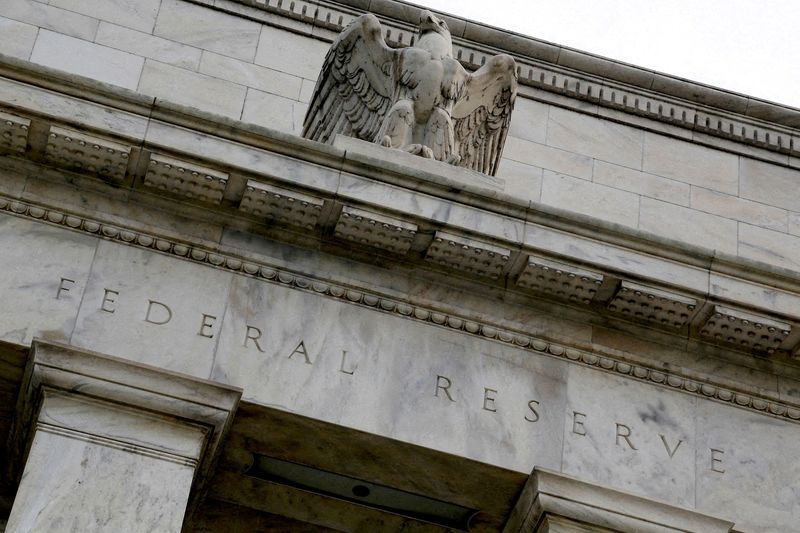By Yoruk Bahceli
(Reuters) -Tighter financing conditions in markets sparked by banking sector turmoil may have done much of central banks' jobs for them, boosting the case for an end to interest rate hikes soon.
In less than two weeks, U.S. banking shares alone have slid over 15%, weaker companies' borrowing costs have jumped and the risk premium on U.S. financial debt is at its highest since May 2020.
Such moves, some economists estimate, are the equivalent of multiple rate hikes by the U.S. Federal Reserve. The turmoil has also prompted investors to scale back rate-hike bets.
The Fed is tipped to raise rates by 25 basis points on Wednesday, compared with expectations of a 50 bps move earlier this month.
European Central Bank President Christine Lagarde reckons market turmoil may do some of the ECB's tightening for it if it dampens demand and inflation.
Financial conditions reflect the availability of funding in an economy, so they dictate spending, saving and investment plans of businesses and households. Central banks have been trying to tighten them by raising rates to slow rising prices.
Since the collapse of Silicon Valley Bank and a rout in Credit Suisse shares that led to its takeover on Sunday by Swiss rival UBS, market funding conditions have tightened sharply.
Torsten Slok, chief economist at Apollo Global Management (NYSE:APO), reckons the scale of tightening was equivalent to adding 1.5 percentage points to the Fed's policy rate.
"Financial conditions are the tightest they have been since the Fed began to increase interest rates," he said, noting a Bloomberg U.S. index factoring in money markets, corporate debt and stock market moves had hit its tightest since March 2020.
Signs of tightening financial conditions were plentiful.
Since March 9, the additional yield U.S. corporate junk bonds pay on top of risk-free rates has risen by a whopping 88 bps.
U.S. bank stocks have fallen some 16%. European banks are down 11% even after a post Credit Suisse-rescue bounce.
The risk premium on debt issued by banks and other financial companies has surged 56 basis points in the United States and 76 bps in the euro zone.
Those moves and heightened uncertainty could lead to a significant tightening in euro zone and UK bank lending standards, Goldman Sachs (NYSE:GS) said, although of less magnitude than during the 2008 financial crisis or 2011 euro zone debt crisis.
"Even assuming that market volatility does subside over the coming days and weeks, we think some residual tightness in financial conditions is likely to remain," said ABN AMRO (AS:ABNd) senior economist Bill Diviney.
"Given that this will do some of the Fed's tightening work for it, by depressing lending to the real economy, this is likely to reduce the need for further policy tightening."
Diviney said this could also be a reason for the Fed to cut rates this year.
Oil prices meanwhile are down 9% since March 9, another disinflationary factor that could help central bankers.
"LARGELY GUESSWORK"
Goldman Sachs said the tightening in bank lending standards it expects could subtract 0.25 to 0.5 percentage points from 2023 economic growth in the United States, equivalent to the impact of another 25-50 bps of Fed rate hikes. The impact risked being even larger, it added.
Others were wary of using market-based indicators to interpret financial conditions at a time when poor liquidity is driving outsized market moves.
"The rates volatility has been driven by inflation and growth fears and positioning washouts so these moves should be taken with a grain of salt," said Patrick Saner, head of macro strategy at Swiss Re (OTC:SSREY), referring to wild swings in government bonds.
"An abrupt tightening of financial conditions matters only to the extent that the tightness is maintained and remains orderly," he said, adding that this depends on central banks maintaining their inflation-fighting resolve.
Dario Perkins, managing director, global macro at consultancy TS Lombard and a former advisor to Britain's Treasury, called estimates of the impact recent turmoil would have on effective policy rates "largely guesswork".
"Central banks no longer have a good idea about the true tightness of monetary policy," he said.
He expected smaller banks to restrict lending in a way that could have a big impact on smaller and medium-sized businesses, in a blow to aggregate demand.
"This will help the authorities to defeat inflation, but in a way that is uncontrolled and intractable, risking unnecessary hardship."
